ARCHIVE – BC & NATIONAL Breaking News [March & April 2018]

Thursday, April 25 ~ VICTORIA. In a move against the illegal production of illicit opioids and to help keep them off the streets, the BC Government is toughening its regulations on pill-press machines and other similar pharmaceutical equipment.
The new Pill Press and Related Equipment Control Act is comprehensive legislation that is part of a broader scheme of initiatives intended to help law enforcement address the fentanyl crisis in BC. The bill aims at restricting ownership, possession and use of equipment that can be used to make illicit drugs, such as automated pill presses, gel cap machines and pharmaceutical mixers.
“Police have asked for more control and monitoring of who has use of pill presses,” said Mike Farnworth, Minister of Public Safety and Solicitor General. “This bill is critical in bolstering police efforts to disrupt the supply chain and get counterfeit pills off of the streets and out of the hands of those who recklessly distribute death-dealing drugs.
“The act will limit lawful ownership of pill presses, and other similar pharmaceutical equipment, to individuals or corporations authorized under the legislation. This includes those with a legitimate business or professional purpose, such as production of drugs or natural health food products, those given a waiver to produce other products that rely on this technology and registered pill-press sellers. The act also sets out significant penalties for offences committed in relation to controlled equipment and activities.
BC’s Pill Press and Related Equipment Control Act is more comprehensive than the legislation that was introduced by Alberta and the federal government in 2016. The federal legislation only requires registration of pill or tablet presses and gel cap machines on import into Canada, and there are no limitations on who can own the equipment.
BC’s legislation requires those who want to sell the equipment to register and agree to a criminal record check. There are also notification requirements for when people acquire and dispose of the equipment, as well as powers to appoint inspectors, so that compliance with the legislation can be monitored. All the provisions will make it easier to track where controlled equipment is, and easier to take it out of the hands of those who are not authorized owners.
“We are losing too many people from all walks of life – friends, neighbours and loved ones – whose lives have been tragically cut short by a toxic, illegal drug supply,” said Judy Darcy, Minister of Mental Health and Addictions. “We know that no illegal drugs are safe, and introducing this legislation will make it harder for people to produce and distribute illegal drugs. We need to approach this problem from all sides and at all levels to save lives and prevent future tragedies.
“Pill-press machines, and other similar pharmaceutical equipment, can be used to turn illicit drugs, like fentanyl, into counterfeit tablets that are sold on the streets, and are able to churn out thousands of pills per hour.
“The BC Association of Chiefs of Police is pleased to see the Province take a leadership role in regulating pill presses and related equipment,” said president of the BCACP and chief constable Del Manak. “This is an important new tool that will be critical in helping us get counterfeit pills off the streets, and will serve as a model for the rest of Canada.
“In addition to this legislation, BC is undertaking action to escalate the response to the overdose crisis, including:
- creating new dedicated anti-trafficking teams within the provincial RCMP and Combined Forces Special Enforcement Unit;
- providing additional resources for all police agencies to support actions against organized crime importers and traffickers, to help stem the flow of fentanyl into BC;
- increasing support for police-based outreach in communities to proactively reach people who are seen to be high-risk;
- providing additional funding for the BC Coroners Service to expand the Drug-Death Investigations Team, and meet an increase in workload and lab testing;
- supplying the City of Surrey with a $175,000 grant to help in their effort to combat the opioid crisis, and to fund collaborative interventions that will help connect vulnerable people to the services they need through new approaches; and
- investing $322 million in new funding and launching the Overdose Emergency Response Centre to combat the overdose crisis and spearhead urgent action to save lives.
The Province will continue to work on a multi-pronged strategy targeted at gangs, drug traffickers and importers to get deadly drugs off the streets, and remains committed to addressing some of the core causes of the opioid crisis, including homelessness, poverty, trauma and the need for improved enforcement.
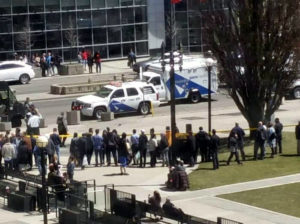
[Update at 5:45 pm April 23: 10 fatalities, 15 injured]
[Update at 10 am April 24: 10 counts of 1st degree murder against the driver of the van, 13 counts of attempted murder; the 15 injured are in three hospitals — Sunnybrook, North York General, and St Michael’s]
[Update evening April 24: officials have updated their numbers as released to the public: 10 fatalities, 14 injured. The distance of the incident as travelled by the van was 2 km. The officer who made the arrest is Cst Ken Lam]
The incident along a highly populated and active commercial office/retail area of a 3km stretch of Yonge Street between Finch Ave and Sheppard Ave saw a man in a rented van appearing to plow down pedestrians at random. The incident occurred around 1:30 pm EDT (10:30 am PDT) on a sunny day.
There were multiple eyewitnesses who have spoken to TV media, describing the incident in various aspects including the actual impact scenario.
Ten of the injured were taken to nearby Sunnybrook Hospital — two were found to be deceased at arrival, and eight are in hospital (five in critical condition, three in serious condition). The identities of the injured and deceased have not been released, but there is a Family Information Line that people possibly related to the victims and injured can call to find out more: 416-480-4940

The threat level in Canada remains at medium. This is not considered to be an organized attack. Public Safety Minister Ralph Goodale says the terror threat level hasn’t changed (since October 2014, put into effect apparently just days before the attack at Parliament Hill in Ottawa). Medium threat level indicates that a violent act of terrorism could occur (low level would mean possible but unlikely).
Government leaders at all levels have addressed citizens through TV media, including Prime Minister Justin Trudeau, Ontario Premier Kathleen Wynne, and Toronto Mayor John Tory. People are asked not to go to that area. Businesses were asked to close for the rest of the day.
Investigators are on scene. Some bodies remained on the sidewalk under orange covering, while investigators made their way around the incident area.
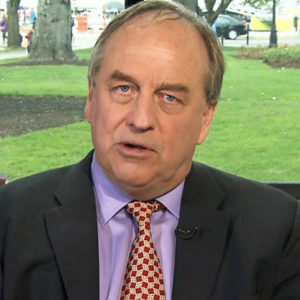
Sunday, April 22 ~ BC Green Party leader Andrew Weaver has issued the following statement for Earth Day:
“Earth Day encourages us to appreciate the natural environment in all its forms, but it also reminds us of the responsibility we have to ensure the health of our planet.
“The theme for this year’s Earth Day campaign is ending plastic pollution. Plastic pollution is visible close to home in BC; it marks our beaches, landfills and lives. If you are interested in learning more, getting involved, or signing the Earth Day Network petition, we encourage you to visit www.earthday.org .
We have committed to ending plastic pollution in our office and everyday lives by using reusable coffee cups and staying away from plastic straws!
“We would also like to acknowledge the incredible beauty and diversity of British Columbia as a whole. As BC Green MLAs, the mission of Earth Day to promote environmental sustainability underlies all our work. We continue to work hard every day to champion evidence-based policies that will enable British Columbians to enjoy our unparalleled beautiful natural environment for generations to come.”
 Wednesday, April 18 ~ VICTORIA. Today in Victoria, Premier John Horgan announced his government’s new Building BC Community Housing Fund with an investment price tag of $1.9 billion. The funding is for building 14,000 new rental homes throughout BC to help make housing more affordable for seniors, families, and low- and middle-income seniors.
Wednesday, April 18 ~ VICTORIA. Today in Victoria, Premier John Horgan announced his government’s new Building BC Community Housing Fund with an investment price tag of $1.9 billion. The funding is for building 14,000 new rental homes throughout BC to help make housing more affordable for seniors, families, and low- and middle-income seniors.
“Too many people struggling to find a place to live,” said Premier Horgan, with a further explanation that improved housing opportunities also helps businesses because then employees can find places to live. As a way of putting the new funds into context, Horgan said that this is “not about building individual condos, stratas, or a house but a systematic and methodical plan” to help those with middle incomes, who are homeless, and “those who are struggling to make ends meet”.
The announcement was made along with Selina Robinson, Minister of Municipal Affairs and Housing, on Wilson Street in the VicWest area of the Victoria core. Victoria Mayor Lisa Helps was on hand to support the announcement as well where new housing will be built. The project has three target components: 30% of the units will be for households with moderate incomes, 50% for low-to-moderate income at market-driven rent levels, and 20% for low income on deeper subsidy (such as income assistance).
“It will capture the continuum of housing needs in the community,” said Premier Horgan, adding that it’s first time that the coop housing sector can access funding. Horgan identified Pacifica Housing, M’akola Housing, and communities (municipalities) with new opportunities now to meet the broad range of needs.
“We’re building British Columbia by investing in homes for people who live and work in our communities,” said Premier Horgan. “Fixing the housing crisis is not just about ownership. It’s about making sure that British Columbians who rent rather than own can find homes they can afford and have a future in.”
The $1.9 billion investment over 10 years is set to deliver safe, secure and affordable housing for BC renters. This housing will be built through partnerships with municipalities, non-profits and co-ops.
“People are struggling in the midst of this housing crisis. We need to do everything we can to make housing more affordable,” said Selina Robinson, Minister of Municipal Affairs and Housing. “Through the Community Housing Fund, people who have been squeezed out of the tight rental market will be able to find a place to call their own, so they can stay in their community.”
BC Housing is issuing requests for proposals (RFPs) to identify prospective partners, including non-profit societies, housing co-operatives and municipalities, that want to develop and operate mixed-income rental housing projects.
“Providing new affordable rentals for low- to moderate-income families and individuals keeps them living and working in our city,” said City of Victoria Mayor Lisa Helps. “We look forward to working with the Province on developing new, affordable housing for the city.”
Projects will be prioritized based on a number of criteria, including targeted clients and the impact the project would have in reducing the community’s affordable rental housing need.
“Non-profit housing providers have been anxiously awaiting this day – the launch of a historic investment in affordable housing,” said Dean Fortin, executive director, Pacifica Housing. “We all know the fundamental importance of decent housing to enable the building of strong and resilient families and children and how important quality housing is to individuals in determining a quality of life every citizen deserves.”
Each project built under the Building BC: Community Housing Fund will reflect the following mix of incomes:
* 30% of the units will be for households with moderate incomes. These are defined as household incomes up to $71,200 for homes with fewer than two bedrooms, or up to $104,000 for homes with two or more bedrooms.
* 50% of the units will be for low- to moderate-income households. These are defined as household incomes below the Housing Income Limits, which range from $21,000 to $95,000, depending on the community and the unit size.
Housing Income Limits represent the income needed to pay the average market rent. Average rents are derived from Canada Mortgage and Housing Corporation’s (CMHC) annual Rental Market Survey.
Rents for these units will be targeted at the CMHC definition of affordability, at or below 30% of the household income. 20% of the units will be for households with low incomes. Households requiring a deeper level of subsidy, such as those receiving income assistance. These are incomes below $15,000 to $30,000, depending on unit size.
Budget 2018 launched the biggest investment in housing affordability in BC history: more than $7 billion over 10 years. The Province has set an overall target of creating 114,000 new homes, including affordable market rental, non-profit, co-op, supported social housing and owner-purchase housing through partnerships.
LINK: Homes for B.C.: 30-point plan to address housing affordability for British Columbians: bcbudget.gov.bc.ca/2018/homesbc/2018_Homes_For_BC.pdf
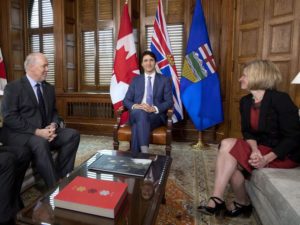
The Trans Mountain pipeline will go ahead, but it sounds like with stricter conditions in the Oceans Protection Plan which Horgan pushed hard for. In particular, those protections would be about cleaning up any spills of diluted bitumen.
Legislative and financial measures will be brought forward by the federal govt in the days ahead, said Horgan. Prime Minister Trudeau is scheduled to address media shortly (10 am PDT).
Horgan said that “all three parties to this morning’s discussion have common values on a whole range of issues”. He said he gives “full credit to Trudeau for bringing Premier Notley and I together.”
Seeing not much room for more he can do on the pipeline file, Horgan turned comments to his mainstay governance in BC: “My concerns are for the people of BC, including balancing the budget over the next two years and delivering services for people,” said Horgan. He articulated overall lifestyle affordability and the importance of affordable accessible child care.
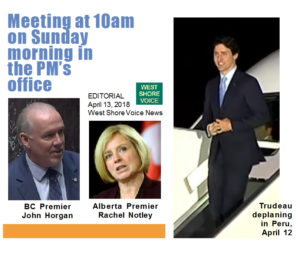 Saturday, April 14 ~ NATIONAL. WEST SHORE VOICE NEWS EDITORIAL.
Saturday, April 14 ~ NATIONAL. WEST SHORE VOICE NEWS EDITORIAL.
In the hot seat this Sunday will be Prime Minister Justin Trudeau. On Thursday he had headed off to Lima, Peru for a long-planned trip to represent Canada at the Summit of the Americas. But brewing here at home is a calamity that is ready to boil over.
BC and Alberta are at loggerheads over the twinning of the Trans Mountain pipeline (project activity now suspended to May 31 by its corporate owner Kinder Morgan), and their political positions seem immovable now.
The remarkable people skills that Trudeau has exhibited in other high profile situations (e.g. the much-noted in-control handshake with Trump at the White House last year) will probably be put to their greatest test yet in this, his first term in office. How does one get two NDP Premiers to capitulate even an inch from their understandably entrenched positions that are essential for political survival past their own first terms in office — John Horgan to protect the natural environment that is the soul of BC, and Rachel Notley to resurrect the oil-rich economy of Alberta.
The private meeting on Sunday April 15 at 10 am EDT in Trudeau’s office at Parliament Hill will be relatively short, as media will be addressed by Premier Horgan at 11 am EDT (8 am Pacific) and by Trudeau at 1 pm EDT, followed by Trudeau’s departure to Paris, France at 2 pm. pm.
The fact that Trudeau announced the relatively awkward shift in his itinerary literally moments before he boarded the plane in Ottawa on his way to South America on Thursday, somehow indicates the difficulty he had in making a decision about how to finally step into the pipeline issue boxing ring. Trudeau has been criticized of late for remaining passive while Alberta and BC duked it out in Alberta’s brief trade war tactics and BC’s sidestep move to let the courts decide.
Among media who follow the PM’s daily itinerary, there was puzzled chatter about why he took a ‘personal day’ off mid-week, ahead of his trip. Given Trudeau’s load, a day off ahead of a long international trip for contemplation about larger issues is not unreasonable. In fact, it shows good judgement and a deeper awareness of how significant the BC-Alberta issue is, than people give him credit for.
The BC-Alberta crisis leans close to being a constitutional one, over and above the significant impacts for politics in BC and Alberta and for the Canadian economy (jobs and investor confidence). That’s enough of a challenge to tackle. But Canadians may also witness the ‘Ottawa summit’ of western NDP premiers with their prime minister as a moment in which Trudeau demonstrates his most masterful problem-solving yet.
These are tough times for leading Canada — NAFTA negotiations with the Trump-led USA, taking a bit of a back seat in the USA-led attack on Syria Friday night, legalizing cannabis in a somewhat frenzied hurry, and a true housing affordability crisis. On top of this, brokering a successful outcome from his meeting with Horgan and Notley would be a helpful shining star in Trudeau’s leadership cap.
Read this Editorial on its own HTML page.
Friday, April 13 ~ INTERNATIONAL. This evening Friday April 13 at 9 pm Eastern Daylight Time (6 pm Pacific), the Pentagon announced that the US military together with the UK and France as Allies, had this evening launched a targeted missile strike on chemical weapon research and development sites as well as command post locations in Syria.
US Military officials said that targets were chosen that would minimize risk to innocent civilians – which likely means not having destroyed actual stores of chemical weapons.
Prime Minister Justin Trudeau, has issued the following statement today on airstrikes in Syria: “Canada condemns in the strongest possible terms the use of chemical weapons in last week’s attack in eastern Ghouta, Syria. Canada supports the decision by the United States, the United Kingdom, and France to take action to degrade the Assad regime’s ability to launch chemical weapons attacks against its own people. We will continue to work with our international partners to further investigate the use of chemical weapons in Syria. Those responsible must be brought to justice.”
The aim of the strike was to deter the Syrian regime from using or producing more chemical weapons. The most recent chemical agents used in an attack in Syria this week were determined to have included the use of chlorine, and possibly the nerve gas sarin.
The US Military told media that more information would be provided tomorrow morning, April 14, approx 9am Eastern Time.
[This summary compiled from watching live coverage of the Pentagon’s media conference and followup live news commentary on CBC TV, and the Prime Minister’s website.]
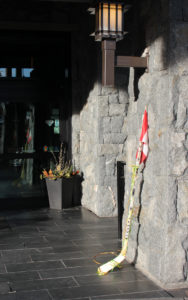
The bus collided with a semi-trailer unit include 10 players, the bus driver, two coaches, the athletic therapist, a volunteer statistician and a broadcaster. The truck driver had two weeks driving experience for driving a truck of that size. The driver of the semi was not injured but is now receiving trauma counselling.
RCMP had initially indicated 14 fatalities having occurred as a result of the Friday April 6 crash. But by the next afternoon, police said in a news release that another person had died (due to a mixup in identities by medical personnel). This week, on Wednesday April 11, athletic therapist Dayna Brons, 26, who had been injured in the crash, died in hospital. She had been the only woman on the bus.
The 13 others on the bus were injured, some of them critically. At least one has a broken back and will not be able to walk, but he is already talking about taking up Paralympic hockey.
The first funeral of more to come was held today April 12 in Humboldt.
A crowd-source funding page on Go Fund Me — for victims and those impacted by the crash — is at https://ca.gofundme.com/funds-for-humboldt-broncos .
The page was started by a hockey mom with the Humboldt Broncos Jr Hockey Association Inc within hours of the crash. Now just over five days later, the $4 million goal on that page has been immensely exceeded, reaching $9,888,498 by about 3 pm PDT.
There have been 117,258 donors contributing to the support fund as of this afternoon. The list includes families, individuals, hockey clubs and sports teams, businesses (including a bank branch, car dealerships and travel agency, a couple of Tim Hortons franchises, health associations and schools, professionals including a financial services company and the Canadian Council of Criminal Defence Lawyers, and the Toronto & Area Road Builders Association.
The donations made today range from $5 to $5,000. Most are in the $20 to $250 range. Many are made in a person’s name but some are anonymous whether the amounts are large and small.
Hockey sticks are being laid to rest against walls, porches and public places. It’s a gesture of empathy and support has been adopted worldwide following this tragedy, showing support for the families, friends and team-sport community that has been impacted by the crash. Today April 12 people were asked to wear hockey jerseys to demonstrate their support.
Weather conditions were bright and clear on the day of the accident. But the corner at Hwy 35 and Hwy 335 in northern Saskatchewan has been considered by locals for years to be a dangerous one due to crossing management (a stop sign for one highway but through-traffic for the other) and a tall stand of old-growth trees that might be found to have blocked the sightlines for traffic from one or both directions.

Sunday, April 8 ~ BC. Trans Mountain pipeline expansion was put on hold today April 8 as Kinder Morgan Canada suspended all non-essential activities and related spending on the project in the face of mounting opposition from both the government of British Columbia and environmental protesters.
Kinder Morgan said its decision is based largely on the BC government’s legal challenges to the pipeline and the need to protect its shareholders.
BC Premier John Horgan issued a statement around 4:30 pm this afternoon, regarding Kinder Morgan’s decision to suspend non-essential spending on the Trans Mountain expansion project:

“British Columbians expect their government to stand up for their interests and our coast, and to do everything we can to protect our land and waters, our coastal communities and our local economies. The federal process failed to consider BC’s interests and the risk to our province. We joined the federal challenge, started by others, to make that point. We believe we need to grow the economy, while protecting the environment. We want to work to address these challenges together. But we will always stand up for British Columbians, our environment and the thousands of jobs that depend on our coast.”
Alberta Premier Rachel Notley said her government would consider taking on an equity stake in the pipeline if Kinder Morgan investors are considering backing away. “If we have to, Alberta is prepared to do whatever it takes to get this pipeline built,” said Notley, without discussing the dollar value of such a significant investment.
While Prime Minister Justin Trudeau has seemingly been waiting for the cards to fall one way or another, today federal Natural Resources Minister Jim Carr issued a statement: “The government of Canada calls on Premier Horgan and the BC government to end all threats of delay to the Trans Mountain expansion. His government’s actions stand to harm the entire Canadian economy.”
Saturday, April 7 ~ SASKATCHEWAN. Junior hockey team in crash: 15 fatalities. Mid-afternoon on Friday April 6 a bus carrying the Humboldt Broncos junior hockey team was hit by a semi-trailer truck in northern Saskatchewan (about 300 km north of Regina). Of 29 people on the bus, 15 died: 10 players (ages 16 to 21), the bus driver, two coaches, a volunteer statistician and a broadcaster. The other 14 were injured.
As of 9:15 pm on April 7 a GoFundMe page at https://ca.gofundme.com/funds-for-humboldt-broncos had raised $2,743,903 of their $4 million goal (raised by 40,705 people in one day) to help support families of the victims. Additionally, WestJet has offered Bronco hockey family members assistance getting to Saskatoon by plane.
The Humboldt Broncos junior hockey team was on their way to a playoff game against the Nipawin Hawks in northeastern Saskatchewan.
Former NHL player Sheldon Kennedy recalled to TV media about a team — oddly enough also with a Broncos name (Swift Current Broncos) — that in 1986 had a bus accident in which four of his teammates were killed. His team’s bus had hit a patch of ice and crashed while the hockey team was en route to Regina. Kennedy said the collective trauma is far-reaching and residual.
 Wednesday, April 4 ~ BC. There’s only one day left to contribute your opinions to the proposed changes to ICBC auto insurance rates. The BC Government’s aim is to make rates more fair for all vehicle owners (excluding those with fleet vehicles).
Wednesday, April 4 ~ BC. There’s only one day left to contribute your opinions to the proposed changes to ICBC auto insurance rates. The BC Government’s aim is to make rates more fair for all vehicle owners (excluding those with fleet vehicles).
Feedback is being accepted online to 4pm on Thursday, April 5 at https://engage.gov.bc.ca/ratefairness/
Input from this survey will help inform ICBC’s application on Basic insurance rate design to its regulator, the British Columbia Utilities Commission (BCUC). The survey was launched March 5.
Changes to the current system would make all drivers more accountable for their decisions and driving behaviour, says the government on the survey website. The survey takes about 15 to 20 minutes to complete. You will be asked things like how long you’ve been driving (and how much of that time in BC) as well your opinion on a range of questions about penalties, rate increases, and discounts.
“The model ICBC uses to help determine insurance rates is more than 30 years old. While it has seen some improvements over the years, it is out of date. This means that right now some drivers are paying more and others are paying less than the risk they represent,” the government says. Adding: “British Columbians have been saying for years that the system would be more fair if lower risk drivers paid less for their insurance, and higher risk drivers paid more. We agree. Currently, most high-risk drivers are not paying enough to cover the future risks they represent on our roads.”
Submissions on the proposed changes by organizations and experts will be posted online.
 Wednesday, April 4 ~ LANGFORD. A groundswell of discontent has arisen in Langford over the BC NDP Government’s housing policy.
Wednesday, April 4 ~ LANGFORD. A groundswell of discontent has arisen in Langford over the BC NDP Government’s housing policy.
Set off by a public and political vocal backlash about the BC Speculation Tax that was allowed room to grow for about five weeks between rollout of BC Budget 2018 and a fuller explanation of tax implementation, now the complaints are widespread about housing. The cost to build housing and the prices at which market homes must sell… these are economic issues of supply and demand.
The pushback is coming not just from those who will be directly affected by the tax that sees vacant homes. It’s also from the developers who produce homes and rely on a marketplace that can afford them, including Realtors who will feel the squeeze in trying to sell continually more costly homes. In Langford, about 70% of residents are homeowners. The Westhills area alone sells about 150 homes per year.
Now the City of Langford — the fastest growing municipality in BC — has broken ground at a formal level, their Council agreeing at their April 3 regular council meeting to write a letter to the BC Ministry of Finance requesting that Langford be exempt from the Speculation Tax. Further to that, Langford Mayor Stew Young on behalf of the city was authorized by his council to write a letter to the Minister of Finance Carole James and BC Premier John Horgan expressing concerns over the tax. And on top of all of that, Council hopes that the entire Capital Regional District (CRD) will be excluded from the Speculation Tax or that the Province will consider allowing municipalities within the CRD to opt-in or opt-out of the tax on a case-by-case basis.
Clearly leading Langford in its fast-paced economic growth in recent years, Langford Mayor Stew Young said at council last night that Langford attracts investment from outside the region as a way to help the economy. The Speculation Tax is already spooking would-be buyers from Alberta and beyond. Young feels that other Canadians should not be pushed away from BC, that the tax was supposedly originally intended to eliminate speculation by foreign buyers.
At the council table, Mayor Young suggested that perhaps those who have written the new tax details at the Finance ministry are missing the impact of the consequences of their policy-driven paperwork, that “they don’t understand, or perhaps they don’t own homes”. Langford Councillor Lillian Szpak pitched out “what happened to co-op housing and rent control?” as two examples of “housing choices that are missing in their plan”.
After hearing presentations from developers, the president of the Victoria Real Estate Board (VREB), and others on the supply-side of the housing equation, Langford Council readily adopted this break-rank move to be the first municipality in BC to formally oppose the Speculation Tax. However the part about getting the CRD on board -– not so much, said Councillor Denise Blackwell, who reminded fellow councillors that due to the governance structure of the CRD board that Victoria and Saanich (which of all CRD municipalities are probably feeling the most pressure on housing affordability and supply) have the majority of votes at the CRD board table. And Mayor Young said that in his recent meeting with the Finance Ministry that there didn’t appear to be much room for sway.
Keeping in mind that this was in March at the tail-end of the winter season in which the housing market is in its usual pre-spring quiet zone, Westhills reports a 20% drop in visits to their show homes (detail update since last night) and a 15% drop in visits to their website in recent weeks . “The market doesn’t like uncertainty,” said Dale Sproule, Manager of Real Estate Sales & Marketing , Westhills Land Corp. “The best way to keep the housing crisis in line is to have more product, not more taxes,” he told Council.
VREB president Kyle Kerr said that a 10% drop in housing values would result in a $90 billion loss in equity across the province. However, he reiterated what housing analysts have long surmised, that housing values in south Vancouver Island will always see high demand due to desirable geographical factors. Indeed, house prices went up again in March 2018 to now an average sale price of $903,052 in overall Greater Victoria (up over $26,000 in one month from the February overall average sale price of $876,397). The west shore breakdown for March 2018: $754,867 in Colwood (12 sales), $723,450 in Langford (53 sales), and $554,704 in Sooke (27 sales).
In that light, like all the other speakers, Kerr concluded that increased supply is the way to maintain an active market. He noted that some homeowners are now not able to renew their mortgages under present market conditions. Since last fall, the dampening effect of the mortgage qualification ‘stress test’ effective January 1, 2018 coupled with now three interest rate hikes since summer 2017 has had the Bank of Canada’s desired impact of putting the brakes on an overheated (over financed) housing market. Naturally, the developers and Realtors are going to squeal at the impact.
The BC Real Estate Association in their April 4 Market Intelligence report calls the BC Government’s attempt “ to drive down the price of homes through demand-side policy” would cause home construction activity to “fall dramatically” and that home builders would cut back production 25%. “That’s 10,000 fewer housing starts in the first year alone,” says BCREA, saying the overall impact of the new housing policy will have a “negative shock” on home prices that would impact both homeowners and renters. BCREA reports are penned by their chief economist Cameron Muir and economist Brendon Ogmundson.
Last week, Finance Minister Carole James clarified that the speculation tax applies only to non-residents with multiple properties that are sitting empty in major urban centres. “Home prices didn’t spike overnight, and our housing problems can’t be fixed with a single budget,” she said.
In the BC Government’s 30-point Plan for Housing Affordability in BC a $6.6 billion investment over 10 years to deliver 114,000 affordable homes is listed, intended to “fill gaps in the market including homes for growing families, home for seniors, housing options for women and children fleeing violence, and homes for students”. Rental units for “the missing middle” defined as “skilled workers” are being addressed with $378 million over three years and over $1.8 billion over the next 10 years. None of this directly addresses the supply side of the traditional mainstream real estate market that the developers and Realtors are calling the alarm on. But if the provincial government fully intends on dampening house prices (hand in hand with federally-imposed efforts that seem to be working), it seems they have indeed already stepped on the toes that make housing happen.

Tuesday, April 3 ~ BC. Effective April 6, 2018, emergency alerts in British Columbia issued through the national Alert Ready program can also be sent to compatible wireless devices, such as smartphones, to ensure more people have the information they need to act quickly in an emergency.
To find out if your wireless device is compatible with the Alert Ready system, visit: www.AlertReady.ca
Wireless alerts will be publicly tested for the first time in BC on May 9, 2018, at 1:55 p.m. (Pacific time), alongside routine television and radio tests. Emergency Management BC (EMBC) is the sole agency responsible for issuing emergency notifications on the Alert Ready system in the province, and will initially issue such alerts for tsunami threats only. The Province is considering expanding the use of Alert Ready beyond tsunamis to include other hazards and emergencies in the future.
“Accurate and timely information in an emergency situation can save lives and livelihoods, and we need to deploy every tool available to alert people of potential public safety threats,” said Mike Farnworth, Minister of Public Safety and Solicitor General. “As technology improves, we are always looking for new ways to broaden our reach and reduce the time it takes to communicate critical safety information. Wireless alerts will help us achieve both of those objectives.”
Wireless alerts will contain instructions for a safe response, and all British Columbians are urged to abide by these instructions without delay. In order to receive alerts, mobile phones must be connected to a cellular network, be alert-compatible and within the alert area. They will be broadcast automatically at no cost to the user. Wireless-compatibility information is available at: www.alertready.ca
“Wireless alerts are a welcome addition to our current alerting tools,” said Jennifer Rice, Parliamentary Secretary for Emergency Preparedness. “These alerts will complement the Provincial Emergency Notification System (PENS), social media and, at the community level, sirens, subscription-based text message alerts and other mechanisms,” says Rice.
“As the Province continues to refine its emergency management system, it is equally important that all British Columbians take their own steps to prepare by understanding the risks where they live and work, creating an emergency plan and assembling an emergency kit,” Rice said.
The National Public Alerting System (NPAS), publicly branded as Alert Ready, is a collaborative initiative between federal-provincial-territorial governments and industry partners. It provides a standard alerting capability to rapidly warn the public of imminent or unfolding hazards to life.
Currently, in accordance with a 2014 Canadian Radio-television and Telecommunications Commission (CRTC) decision, all radio and television broadcasters in Canada are mandated to broadcast public alerts. On April 6, 2017, the CRTC mandated wireless service providers to be capable of sending wireless public alerts in Canada by April 6, 2018.
- To find out if your wireless device is compatible with the Alert Ready system, visit: www.AlertReady.ca
- Alert Ready frequently asked questions: https://www.emergencyinfobc.gov.bc.ca/alert-ready-wireless-public-alerting/
- PreparedBC is a one-stop shop for disaster readiness information. How to prepare an emergency plan and what to include in an emergency kit: www.gov.bc.ca/PreparedBC
- Prepared BC on Twitter: www.twitter.com/PreparedBC
- For information during active provincial emergencies, visit www.emergencyinfobc.gov.bc.ca and on Twitter: www.twitter.com/EmergencyInfoBC

Friday, March 30 ~ OTTAWA. Judicial system changes announced
Mandatory minimum sentences that were introduced under the Harper Conservative government (thought to restrict the discretionary powers of judges) have not been changed. But many other changes to the judicial system — aimed at speeding up access to justice as delivered by the courts federally and in provinces and territories — were announced by federal Justice Minister Jody Wilson-Raybould on March 29 in Ottawa.
The changes in the proposed 300-page Bill C-75 also include an end to peremptory challenges in jury selection (i.e. jurors now can’t be disqualified by legal teams without providing a reason). A need for this came to light in a recent case in Saskatchewan where five apparently-Indigenous jurors were excluded from the jury without reason.
To help reduce backlogs and system overload, the proposed legislation would restrict preliminary inquiries to those accused of an offence punishable by life imprisonment, which is expected to reduce the number of preliminary inquiries (presently over 9,000 per year) by 87%.
The legislation proposed in Bill C-75 also takes steps to address the over-representation of Indigenous persons seen within the criminal justice system and addresses domestic (‘intimate partner’) violence. It would impose a reverse onus on bail applications by people who have a history of abuse, requiring them to justify their release following a charge.
According to the Office of the Commissioner for Federal Judicial Affairs Canada, as of March 1, 2018 there are 1,158 judges presently in office; of those, 453 (39.1%) are women. There are 56 judicial vacancies across Canada as of March 1 (five of those federal, the rest being provincial/territorial including 14 vacancies in Alberta, eight in Ontario and seven in BC). Minister Wilson-Raybould told national media that it takes time to achieve hiring for the range of representation sought by the Liberal government for these appointments.
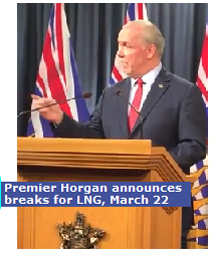
Sunday, March 25 ~ BC. And just when few people expected to be hearing about LNG in the NDP/Green renewed political landscape of BC, it was announced on March 22 by Premier John Horgan that he has opened the door to at least one possible LNG project.
Some serious players are involved in the project — notably Shell Canada, South Korea’s Kogas, Japan’s Mitsubishi Corp and PetroChina Co Ltd; they are reportedly meeting next week to discuss their options, with a final announcement expected later this year.
The consortium’s proposed $40 billion LNG Canada project for Kitimat (extraction, pipeline, export) would enjoy a deferral of having to pay provincial sales tax (PST) until revenues are actually rolling in from liquefied natural gas production, as well as seeing electricity billed at regular industrial rates (instead of a higher LNG rate that was set by the former BC Liberal government).
As in any business deal, each side offers generally something to sweeten the pot. What LNG would bring to BC is stable long-term revenue (potentially $6 billion over 40 years), and for the producers the ‘let’s make a deal’ tone of the tax framework is likely attractive, including the component of freezing the carbon tax at $30/tonne.
What Horgan is now up against is not only public opinion on the climate protection side of things, but a blustering stance from the BC Greens about “an undue burden on existing industries and the public to reduce their emissions beyond what is already required”, as stated by Green Party Leader Andrew Weaver, adding: “We would no longer have confidence in government (if the LNG deal went forward unamended).”
 Saturday, March 24. Yes, tonight is the night for Earth Hour. For now 12 years, electricity usage reduction for one hour on a Saturday night in March has been a way to raise awareness about energy conservation around the globe.
Saturday, March 24. Yes, tonight is the night for Earth Hour. For now 12 years, electricity usage reduction for one hour on a Saturday night in March has been a way to raise awareness about energy conservation around the globe.
At local time this evening March 24, it’s lights-out (and turning off electricity-drawing appliances) from 8:30 pm to 9:30 pm.
Starting as a symbolic lights out event by the World Wildlife Foundation (WWF) in Sydney, Australia in 2007, Earth Hour organizers say their event is now the world’s largest grassroots movement for the environment, inspiring millions of people to take action for our planet and nature.
The movement is people-driven. “From pushing for environmentally-friendly laws and policies to crowdfunding for a better future, YOU make Earth Hour possible. Coordinated by WWF and other volunteer organisations, Earth Hour’s greatest strength is the power of people,” say organizers. This year’s hashtag is #CONNECT2EARTH. More at www.earthhour.org
In BC, the reduction of electricity usage in each community is tallied by BC Hydro each year. Overall, the percentage drop has been lower in recent years, likely as most people already take care to reduce their electricity usage on a regular basis.

Wednesday, March 21 ~ BC. The BC government is launching a new, four-part surgical strategy aimed at reducing wait times for the health care British Columbians need, it was announced today in Vancouver.
One of the first components of the strategy is aimed primarily at the seniors population with five hip and knee replacement programs implemented throughout the province, announced today.
“For far too long, far too many British Columbians were left on waitlists instead of getting fast access to the surgery they needed to enjoy full, active, lives,” said Premier John Horgan today. “We’re getting people back on their feet faster by dramatically increasing access to hip and knee surgeries.”
These programs will address the long waits faced by people. In 2016-17, 30% of people waiting for hip surgery and 38% of people waiting for knee surgery waited more than 26 weeks.
“We are embedding the innovations of the former Richmond Hip and Knee Reconstruction project into our program because it is a public health-care system solution that is proven to work for patients,” said Health Minister Adrian Dix. “Our strategy will not only mean people spend less time waiting for hip and knee replacements, but that we keep up to demand for all surgeries by investing in more surgeries and implementing operating room efficiencies.”
The strategy is supported with ongoing targeted funding of $75 million starting in 2018-19 and increasing of $100 million in 2019-20.
The hip and knee replacement programs are designed to support increased surgical volumes, reduce wait times, and improve continuity of care for patients by coordinating all the services a patient requires to prepare for, undergo, and recover from surgery. They build on the Richmond project by adding new components like dedicated operating room time, pre- and post-surgical support, centralized intake, standardized assessment, first available surgeon and ongoing evaluation.
“We are thrilled to be part of this important work and announce the new hip and knee replacement centre at Vancouver General Hospital,” said Dr. Bassam Masri, Vancouver Coastal Health’s surgeon-in-chief for Vancouver Acute and the head of the orthopedics department. “Streamlining the intake and assessment process for hip and knee replacement surgery reduces wait times for patients, providing them with comprehensive, wrap-around care before and after surgery so they can get back to living their lives in the best way possible. With people spending less time in hospital, we are able to perform more surgeries.”
In 2016-17, approximately 14,390 hip and knee surgeries were performed, and by 2018-19, more than 19,250 will be done annually. The additional surgeries will mean a 34% increase in hip and knee surgeries. This will significantly reduce the number of patients waiting.
In total under the surgical strategy, 9,400 more surgeries (4,000 additional hip and knee, 900 dental and 4,500 other surgeries) will be done throughout BC by the end of March 2019, compared to the previous year.
The surgical strategy has four areas of focus:
* Providing more surgeries in areas with long wait times, starting with hip and knee surgeries and incrementally tackling other surgeries with long waits;
* Investing to keep up with growing demand for all other surgeries;
* Making surgical programs and operating rooms in the province more efficient through better planning and scheduling and, establishing centralized booking and a single point of contact for patients; and
* Making sure the right number of health professionals are in place to deliver the services needed to meet demand both now and into the future, including surgeons and anesthetists, as well as nursing and rehabilitation health professionals.

Tuesday, March 20 ~ BC. There will be a test of the BC Emergency Alerting System at 1:55 pm PDT on March 21, 2018.
The test is being conducted by Emergency Management BC.
This is part of a Canada-wide Alert-Ready system that allows government officials to issue public safety alerts through major television and radio broadcasters. This system will only be used during large-scale disasters or emergencies where loss of life is imminent and possible.
Please note that text messages will NOT be tested at this time. Testing of wireless alerts will begin in May 2018.
You can currently expect to receive emergency alerts via Canadian radio and TV, cable and satellite operators.
Alert Ready is a Canada-wide program that allows government officials in each province and territory to issue emergency alerts.
Tuesday, March 20 ~ VICTORIA. Premier John Horgan welcomed Canada’s Governor General, Her Excellency the Right Honourable Julie Payette, on her first official visit to British Columbia today, as part of a ceremonial welcome at the Parliament Buildings in Victoria.
“It is an honour to welcome the Governor General to British Columbia,” said Premier Horgan. “Her extraordinary list of accomplishments makes her an inspiration to all Canadians.”
Upon arrival, Her Excellency was presented with flowers by Elayna Loehr, 7, on behalf of The Make-A-Wish Foundation of British Columbia and Yukon.
The Governor General was welcomed with a performance by the Lekwungen Traditional Dancers of the Songhees First Nation.
Her Excellency received a 21-gun salute fired by the 5th (British Columbia) Field Artillery Regiment of The Royal Regiment of Canadian Artillery. The Naden Band of Maritime Forces Pacific played the Vice Regal Salute in tribute to her visit.
The Governor General inspected the 100-member Guard of Honour from Maritime Forces Pacific and Canadian Forces Base Esquimalt, and met with veterans in the Upper Rotunda Memorial Hall in the legislative precinct.
Accompanied by the Premier, Her Excellency signed the Distinguished Visitor’s book in front of the Coat of Arms.
The Governor General will participate in several events during her visit to Victoria and Vancouver from March 20 to 22.
Tuesday, March 20 ~ VICTORIA. The Honourable Judith Guichon has offered her congratulations to Janet Austin, OBC, on the announcement of Austin’s appointment to be the 30th lieutenant-governor of British Columbia.
“I am so pleased to welcome Janet Austin as the next lieutenant-governor of British Columbia. As someone who has dedicated her career to championing women’s equality and social change, she is a wonderful choice to represent Her Majesty The Queen in this great province,” said Guichon. “Ms. Austin will continue to inspire and connect British Columbians in this role.”
Guichon will remain lieutenant-governor until the installation of Austin in the coming weeks.
Wednesday, March 14 ~ COASTAL BC. BC Ferries will add extra sailings on their busiest routes for the Easter Long Weekend.
From March 29 to April 3, the additional sailings between Metro Vancouver and Vancouver Island — on the Tsawwassen-Swartz Bay route and the HorseshoeBay/Departure Bay and Horseshoe Bay/Langdale routes.
The most popular travel times are expected to be mid-day Thursday March 29 to late morning Friday March 30, with traffic returning on the holiday Monday, April 2 in the afternoon.
Checking the bcferries.com website and making reservations are options for busy travellers.
Early morning and late evening sailings are available on select sailings during the Easter long weekend and Spring Break travel period. From March 15 to April 3, standard under-height vehicles with driver can travel from $39 on the four main routes.

Sunday, March 11 ~ Late last night the Ontario Progressive Conservative Party chose Doug Ford as their new leader. Until recently he was going to run for Mayor of Toronto, but shifted to the provincial race after
Ford won on the third ballot. But after a long night of vote counting and discussions about the rules of that, there is now a challenge from candidate Christine Elliot who in fact may have had more of the popular vote among PC members voters. [Update March 12 – Christine Elliot has rescinded her challenge.]
Elliott is a long-time member of the Ontario Legislature. She is the widow of the late Conservative Finance Minister Jim Flaherty. Her three grown sons were supportive to her during this short 3-week campaign.
Ford represents a voter interest in populism, with the usual promises of more money back in people’s pockets instead of being spent by government.
The Ontario Provincial Election will be held June 7. The PC party is hoping to unseat the Ontario Liberals after a 15-year run in Canada’s most populous province.
Wednesday, March 7 ~ Tomorrow March 8 is International Women’s Day. This year in particular sees the federal and BC governments taking heed of gender equity. Here is the BC Government statement from Premier John Horgan and Parliamentary Secretary for Gender Equity Mitzi Dean:
“On International Women’s Day, we celebrate the work of women who have stood up against sexism and discrimination, and we recommit to advancing equity each and every day.
“We are doing our part by making gender equity a priority across government, and making choices that lift women up. That is why our latest budget works toward gender equity by taking real steps to make life more affordable, to improve the services people count on, and to build a strong, inclusive economy.
“Our investments in child care, the largest in BC history, will help parents, especially women, build families while pursuing their careers.
“Our increase to the minimum wage will boost incomes for the lowest-paid people in BC, which will disproportionately benefit women.
“We are also working hard to break down barriers and open up careers for women in trades. Women deserve the opportunity to pursue these rewarding, high-paying jobs, and we need their help building the province.
“Everyone has the right to live without fear. That’s why our latest budget reverses years of declining supports and provides ongoing funding for the services women and girls depend on, including housing, counselling, and crisis supports for survivors of sexual assault and domestic violence.
“We have shown our belief in equity from the very first day of government, by swearing in British Columbia’s first gender-equal cabinet.
“Together we are building a stronger, fairer and more-inclusive province, where everyone has the chance to realize their full potential.”

Tuesday, March 6 ~ VICTORIA. The BC government announced today March 6 that it is “moving to clamp down on high-priced ticket scalping to make live-event tickets more affordable for British Columbians”, and may even ban automated ‘bots’.
“Live events should be an enjoyable experience for British Columbians, not a windfall for scalpers,” said Minister of Public Safety and Solicitor General Mike Farnworth. “The action we’re taking is aimed at protecting people from unscrupulous scalpers and unfair practices that shut average people out from events in BC.”
A three-week survey (launched March 6, running to about March 26) has been launched online at //www.engage.gov.bc.ca/ticketbuying where BC residents may indicate their experiences with ticket buying, reselling, and buying from resellers. Survey results will be used to develop recommendations for improving affordability, fairness and transparency.
“British Columbians are frustrated by ticket price gouging, and want action,” said Spencer Chandra Herbert, MLA for Vancouver-West End. “Working with the people of BC, our government is acting and will develop and bring forward new consumer protections to help make the ticket-buying experience fairer and more affordable.” Improving improving fairness and transparency is the government’s goal, to inform the creation of suitable legislation.
The 30-question survey takes about 10 minutes to complete. It is aimed at people in BC who buy tickets for live events, and those who sometimes resell their tickets, to ensure that changes will improve fairness and transparency in how tickets for live events are bought and sold. Survey results will be publicly available later in the spring.
The public consultation will look to find out specifics on how people feel about parts of the ticket-buying process, such as: how often they purchase event tickets (from resellers, online, through a venue, etc.); experiences reselling tickets; and what changes are needed to improve the fairness in the buying and selling process.
British Columbians have many opportunities to see sports, concerts, live theatre and other cultural or recreational events throughout the province. This survey will help shape the way government gives everyone a fair chance at seeing their desired events.
Alberta and Ontario have passed legislation and had public consultations on ticket-buying practices, and acted on this issue. A Canada-wide Angus Reid poll showed that four in five Canadians would agree with outright banning of software (“bots”) to jump the queue when tickets go on sale; that poll showed that 50% of Canadians feel it’s up to governments to make the necessary changes to protect Canadians. Additionally, the poll said most Canadians see ticket reselling as a significant problem, and 80% believe that purchasing tickets with the specific purpose of reselling them is unfair.
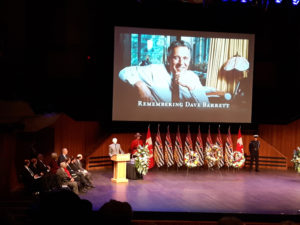
Nearly 1,000 people attended at the University of Victoria’s Farquhar Auditorium for the 10 am occasion.
By all accounts, this is a man who is now fully and joyfully remembered as both a ‘giant’ of the people and a ‘giantslayer’ of lesser glories. He was BC’s 26th Premier.
Former BC Dave Barrett during a short three-year term in office (1972-1975) is forever in the history books for preserving agricultural land in BC by creating the Agricultural Land Reserve, bringing in public automobile insurance so that all vehicle owners could be covered, and creating Pharmacare drug plan coverage for seniors. His government brought in Hansard and Question Period in the legislature, and abolished corporal punishment in schools. And making all that possible his nimble political fervor brought down a 40-year-run of the right-of-centre Socred government of the day.
Speakers delivering tributes included BC Lieutenant Governor Judith Guichon, Premier John Horgan, Retired Roman Catholic Bishop Remi J de Roo, Former BC Minister of Labour Bill King (former MLA Shuswap-Revelstoke), former BC Minister of Lands, Forests and Water Resources Bob Williams (former MLA Vancouver East), Former BC Cabinet Minister and MLA (Vancouver-Hastings) and now Chair of ICBC Joy McPhail, and Marc Elisen who was Barrett’s Deputy Minister and Planning Secretary.
Lt Gov Judith Guichon acknowledged Barrett as BC’s first NDP premier, calling him a champion of the underdog. “He is part of the very fabric of the province,” Guichon said, noting that 357 Bills were passed in the Legislature during his time in office.
BC Premier John Horgan addressed the crowd with this: “He captured the hearts of each and every one of you.” Remarking further on Barrett’s power of oratory, Horgan noted in particular Barrett’s “passion and power of the message of social justice”. Horgan declared that no one will ever forget Dave Barrett.
Barrett’s three grown children spoke about their father with memories, fondness, and emotion.
The on-stage emcee today for the 1-hour-20-minute occasion was BC Finance Minister and Deputy Premier Carole James. A powerful rendition of O Canada was led by a Grade 10 student from Esquimalt High School, Isolde Welby. On stage ahead of the formal portion was the Chroma String Quartet.
Visual presentations on the large screen were modest and brief. The entire event was light-hearted, with a good balance of remembering Dave Barrett for both his political contributions and his happy family life. His wife Shirley attended, and was clearly seen by everyone in her husband’s life as a steady, loving source of support.
In the audience was a wide range of VIPs and the general public, many of whom have been long-time NDP supporters. Mayors of many of Greater Victoria’s municipalities were there, as well as several MLAs.
Dave Barrett (October 2, 1930 to February 2, 2018) had Alzheimer’s leading up to his death at age 87.
Back to current BC/National News | Back to Main page of West Shore Voice News

